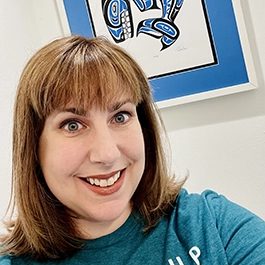Rooting for Sustainable Agriculture
Scientists emphasize adopting sustainable practices like Kernza® for long-term food security and soil health, discussed at the National Science Foundation-funded New Roots annual meeting
Writing for Impact
 In western Washington, the heartbeat of nature is found in streams that nurture salmon, the traditional food of 20 Indigenous treaty tribes. Through the Northwest Indian Fisheries Commission, the tribes manage the salmon population and associated natural resources together with state and federal agencies. This unique partnership is brimming with stories of hardship and hope, and Northwestern University alum Kari Neumeyer is there to ensure they are told.
In western Washington, the heartbeat of nature is found in streams that nurture salmon, the traditional food of 20 Indigenous treaty tribes. Through the Northwest Indian Fisheries Commission, the tribes manage the salmon population and associated natural resources together with state and federal agencies. This unique partnership is brimming with stories of hardship and hope, and Northwestern University alum Kari Neumeyer is there to ensure they are told.
As the Communications Manager for the Commission, Neumeyer and her staff of trained journalists cover regions including Olympia, the north and south sounds, and the central area and coast. Their stories, video, and web content address everything from the tribes’ advocacy efforts to climate change adaptation plans. “Our goal is to very accurately tell the stories and to give the credibility to the work that the tribes do,” she said. Neumeyer graduated with a master of science in journalism from the Medill School of Journalism, Media, and Integrated Marketing Communications in 2001. She began her career as a reporter at a small newspaper in Washington where she first learned about the Commission. “The journalism skills have just gone such a long way. I loved my time at Medill and I learned so much…I’ve always been able to carry with me the journalism ethos for balanced reporting,” she said.
After a court decision in the mid-1970’s, the Commission was founded with a focus on preserving fishing rights noted in treaties from the 1850’s. Since its founding, the work of the Commission has expanded to incorporate larger issues including climate change. The localized work of the Commission, such as managing hatcheries or planting trees to keep streams cool, would not be enough on its own, explained Neumeyer. Rather, they must also keep an eye on all activities impacting the health of the salmon. This includes neighboring developments or industrial practices that could release pollution into the streams. “It’s more than just habitat protection—it’s the air, it’s the water, it’s the emissions, it’s everything,” said Neumeyer. The tribes wish to preserve the salmon populations to feed their own people, and for all others to enjoy in perpetuity as well.
Many tribes have their own natural resources department and climate change scientists. The tribes are sovereign governments that can work within their treaty rights to have a powerful impact on the environment, she explained. Her reporting has covered exciting moments such as when the Lummi Nation stopped plans to build a coal terminal in Bellingham, Washington. “The more that tribes can do to use their treaty right to protect the environment and promote a sustainable economy and energies is exciting to me,” said Neumeyer. “If it is good for the fish, it’s good for other species, and it’s good for the economy in Washington state, which is so much based on fishing and outdoor recreation. It affects all of us,” she said.
The communities Neumeyer works with are on the front lines of climate change, and their insights include those from first-hand experiences. In the coastal region, communities have already had to relocate due to sea level rise. “In terms of the sustainability, this is something that the tribes have better knowledge of than people would expect, they have been thinking about it longer. They should be a trusted resource. People should be looking to the tribes for leadership and stewardship because they have so much experience. They have been doing it all along,” she said.
Neumeyer has had support from Northwestern Medill students over the years, who visited with Professor Emeritus Patty Loew to write and publish stories. “It’s exciting to me to look at students who have this curiosity and this interest…it was really gratifying to me.” As a student, Neumeyer did not know that the type of work she does today was an option. She credits Medill with giving her the training to succeed. “The degree is invaluable. The skills learned at Medill can be used for any career.”
Neumeyer’s work was recently recognized with a media award from the Pacific Northwest International Section of the Air & Waste Management Association. She delights in the recognition but is quick to direct credit to the tribes. “I feel that I am lifting up the voices of the Indigenous tribes who are the ones doing the work,” she shared. “I get the benefit of being the one who is spreading the good news, so I feel optimistic and happy about the work that I do and the product that my department puts out there. I can be hopeful for the future.”
To read more about the work of Neumeyer and the Northwest Indian Fisheries Commission, visit the Northwestern Treaty Tribes online publication.